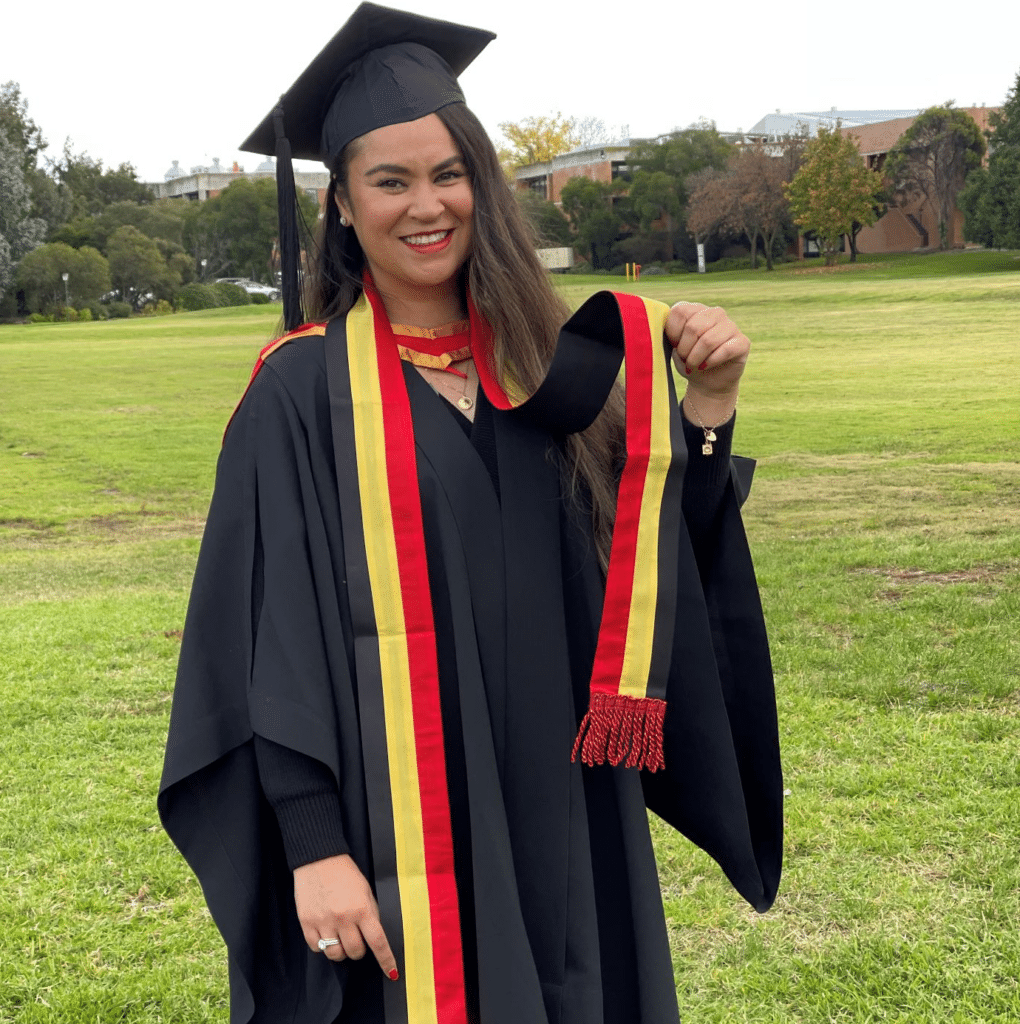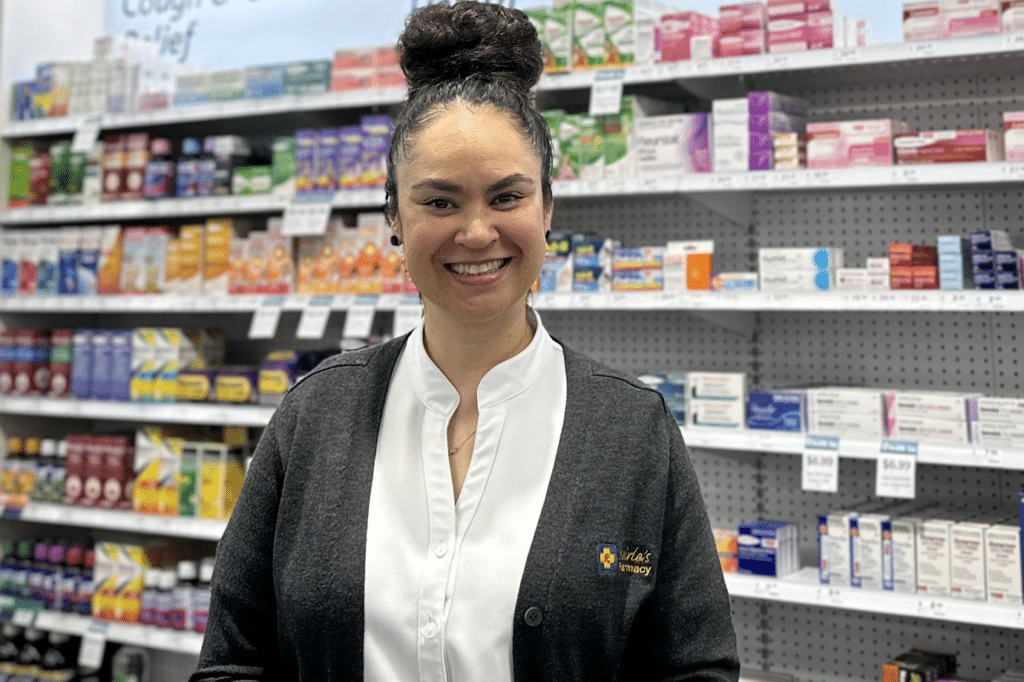Sofoni West Soliman is well-known in her community in Wellington, a small outback town in central New South Wales where one of Australia’s longest-running Indigenous missions still operates.
Nanima is a place of cultural and historical significance with many lessons, both painful and powerful, for anyone living in Australia today.
But for Sofoni, a local pharmacist, it’s home.
The proud Wiradjuri woman grew up there with her four siblings and mother.
“It’s just peaceful, it’s quiet, everybody knows everybody,” she said.
“Wellington is surrounded by lovely mountains, it’s such a beautiful place.”
And Keirle’s Pharmacy, which draws in all walks of life, is a place she gets to make a difference every day.
“It’s just a lovely feeling when you walk into the pharmacy and they greet you by your name and you greet them,” she said. “It’s just good to go in and you can have a laugh. You always get that odd person that may not be having a good day but you just try to put on a smile and try to keep them happy and calm.
“You get along with the staff … you get along with the doctors, the people at the hospital as well, the nursing staff. It’s such a small-knit community.
“Everybody knows everybody.”
As one of the town’s beloved pharmacists, Sofoni holds a critical role between doctors or specialists and their patients.
“I do see myself as the gap between the health professional and the people of the community which makes my job unique,” she said.
“The pharmacist is the middle person so I’ve got to connect to the doctor, and I’ve got to connect to the patient.
“Sometimes there could be a communication barrier … especially when it comes to Aboriginal people because they like to speak lay language.
“That’s why I like to go out and have a yarn to them.”
Building rapport like this is an important part of what Sofoni does because it helps people feel comfortable enough to enquire about their medications and get a better understanding of why and how to take them.
She says some Indigenous clients may be given a lot of information by their doctor but don’t feel comfortable asking questions or may struggle to grasp what’s said because of the language barrier.
When clients feel safe with Sofoni, they open up to her and admit they don’t know why they have been given a certain prescription.
“I just break it down for them and they appreciate it,” she said.
“There are so many career options like I can work in hospital pharmacy, community pharmacy, I can do home medicine reviews.
“And I give vaccinations.
“The first couple [of needles I gave], I was a bit shaky and nervous, but now it’s like you do them all the time … it’s like a nurse.”
Navigating prescriptions, understanding the chemical makeup of different medications and being able to convey the ins and outs of pharmaceutical products isn’t something that has come easy to Sofoni.
In fact, it took several years of intense study and a tough, soul-searching journey through university to get to where she is today.
When she started a degree in Clinical Science and then a Bachelor of Pharmacy, Sofoni was missing some fundamental knowledge.
“Pharmacy is more science-based,” she said. “You have to know all the drugs and how it’s made. And see, I didn’t study any Science, Chemistry, Biology. They’re all the main key subjects that you need in Pharmacy – and I’m going in blind.”
While she had done some TAFE certificates in pharmacy work, university took her to a whole new league.
She was one of the first in her family to get a higher education.
“It [was] actually my boss, he approached me and he asked me, ‘Are you interested in going to university to become a pharmacist?’ and I said, ‘Oh, I’m not sure. Why do you say that?’ and he goes, ‘I think that you’ll make a good pharmacist one day’,” she said.
“It gets me a bit teary because it was a long journey. I’ll tell you what, it was so long but I recently got there. There were many ups and downs where I wanted to quit, I wanted to pull out because it just got too hard, it just got too intense.”
But Sofoni never quit. Despite being behind her peers as a mature-aged student with no science background, Sofoni found a way to push past her struggles.
During the course, she says she often felt “stupid” and lost.
“I had to learn everything from the beginning,” she said.
“When you go to university, the lecturers, they expect you to know the subject at a Year 12 level and I remember saying to the Organic Chemistry teacher, ‘I don’t understand this’ and he goes, ‘What do you mean you don’t understand?’”
Being in a cohort of year 12 graduates who were well-versed in the basics of Chemistry, Sofoni had to tell the lecturer she was not like them and would need more time to keep up. The response from him and other staff was compassionate, she remembers.
“I failed the subject twice, but I got it on my third time so yeah, it was very, very hard,” she said. “[I felt] a bit embarrassed within myself.”
Sofoni says the bitter disappointment of failure and trying so hard only for it to not be enough pushed her very close to quitting the course but thankfully she was surrounded by a personal squad of cheerleaders.
“You just need the right people behind you to give you that support,” she said.
“Without that it’s pretty hard to move forward. I had my family, I had my mum, my two sisters, my [now] husband, my boss, the teachers.”
Almost a decade would pass before Sofoni finally graduated.

“I just picked myself up and learned where I went wrong and worked harder,” she said.
Looking back now, she’s immensely grateful she never gave up. She says being open about what she did not know without carrying shame about it meant she could call out for help – even if that meant reaching out to her old high school to get tutoring in science basics.
“If I can achieve that, I can achieve anything – I was like hit me with knowledge,” she said.
“I used to be scared to talk to doctors, now I’ll just talk to them like a breeze.”
And she encourages others who are thinking about going to university or pursuing further study later in life to give it a go.
“Don’t be [nervous], speak up,” she said. “If you don’t ask, you won’t know. Use the support networks that are there … don’t be scared to speak up and ask, even if you think it’s a stupid question, there’s no such thing. Speak to your teachers … because they’re invested, your performance is a reflection of their performance.”
Today, Sofoni’s efforts pay off at the pharmacy in Wellington everyday and the grit it took to never give up has revealed something profound about who she is as a person.
It’s something she hopes inspires others to never give up, no matter what obstacles they come against.
“Try again,” she said. “I’ve fallen off the horse that many times, and I’ve gotten back up.
“In my final years, mum said, ‘You get back on that horse, and then you give it another day.’
“I said, ‘Mom, my horse has taken off. It’s given up on me. I can’t do it anymore. I’m done. I’ve had enough.’
“But I did, I ended up finding my horse, and I got back on it.”
Sofoni’s NAIDOC message to remember all year:
“I do see myself as a future role model and an inspiration to the Aboriginal people in the community but also the non-Aboriginal people as well.
“If I can do it, you can do it too. You can do anything if you put your mind to it. Strive for the best.”
To mark NAIDOC Week 2024, Women’s Agenda has produced a special edition eMagazine in honour and celebration of incredible First Nations women trailblazing across different sectors in healthcare. Thanks to Charles Sturt University’s First Nations Pathways for its support bringing this eMagazine to life.



